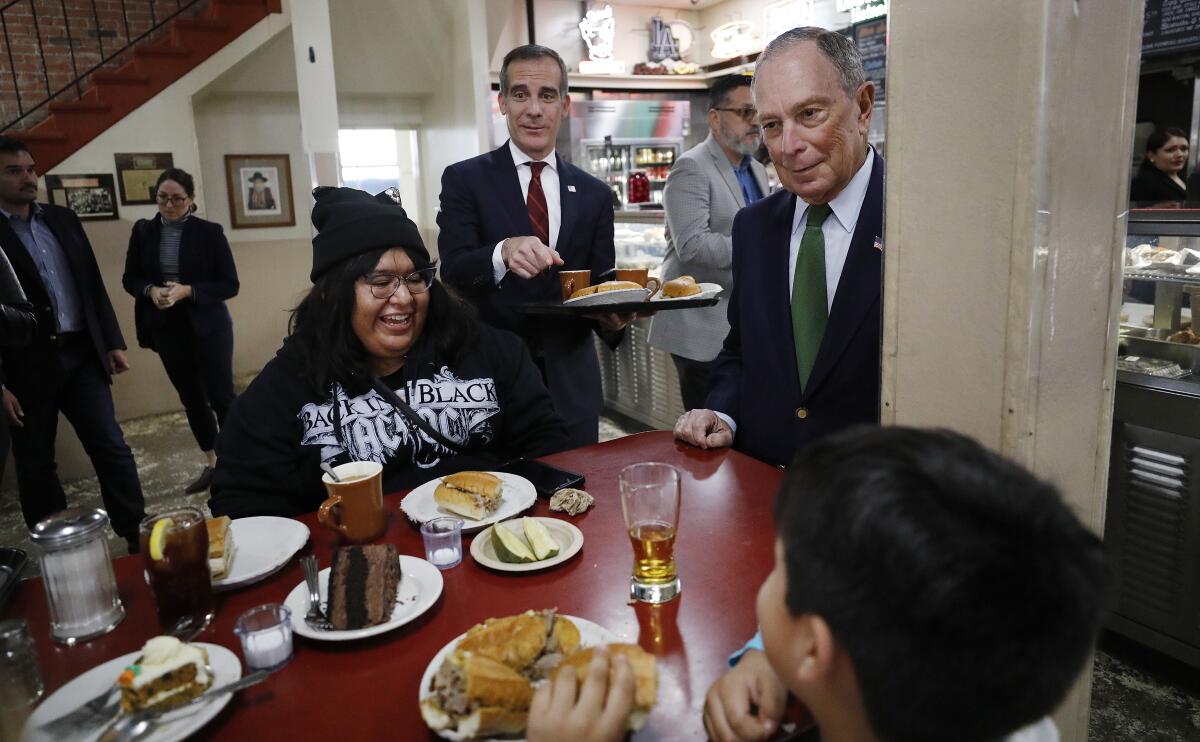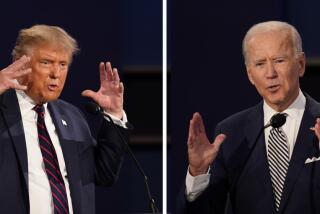Opinion: Could the Democratic race come down to Bernie Sanders vs. ... Mike Bloomberg?

Political polls are notoriously unreliable, but I’m going to point to the results of two new ones anyway that show a collision ahead between two polarizing candidates for the Democratic presidential nomination.
According to the Los Angeles Times, a new UC Berkeley Institute of Government poll shows Sen. Bernie Sanders (I-Vt.) pulling away from the field in California. Sanders is at 26% and rising, while his nearest rival, Sen. Elizabeth Warren (D-Mass.), is at 20% and fading (with a margin of error of 2.5 percentage points).
Meanwhile, the latest Morning Consult poll of national voters shows former New York City Mayor Michael Bloomberg climbing like a rocket since he started dedicating cash-stuffed mattresses to his television advertising campaign late last year. The poll put Bloomberg at 12%, closing in on Warren (14%) but still well behind former Vice President Joe Biden (29%) and Sanders (23%). Biden and Warren have been heading down, Sanders heading up — but not at anything close to Bloomberg’s trajectory.
Conventional wisdom (insert your joke here about the news media and conventional wisdom) holds that Sanders remains an unlikely nominee and that Bloomberg remains a far longer long-shot. And horse-race punditry is every bit as valuable as what you pay for it. But there are trends at work here worth pondering.
In almost every poll tracked by RealClearPolitics, Sanders is leading in the two states that vote first — Iowa and New Hampshire — while Biden is leading in two of the next states to vote — South Carolina and Nevada. That makes Sanders’ rise in California, the biggest prize among the 15 states and territories voting on March 3, especially important.
If Warren doesn’t break through in any of the early states, she may be tempted to throw her support behind Sanders, the candidate whose platform is closest to her own. That would leave a scrum of more moderate Democrats facing a single standard-bearer on the far left — a candidate with a fervent base of support but whose vision of a massive government expansion funded (incompletely) by enormous wealth transfers is unappealing, to say the least, to millions of Americans in the mainstream.
New York Magazine columnist Jonathan Chait did a fine job Tuesday morning laying out why nominating someone as extreme as Sanders would be a huge mistake for the Democrats. In short, Chait noted that such candidacies usually wind up in smoking ruins in November.
I know, progressives argue that the country needs more than just a return to normalcy after Trump. Its problems need a far stronger tonic, which in their prescription includes such things as providing government health insurance with no premiums or copays, taxing wealth, forgiving student-loan debt and defanging Immigration and Customs Enforcement.
Yet I can’t help suspecting that most people don’t want to be whipsawed from an extreme presidency on the populist right to an extreme presidency on the populist left. They want temperatures to cool, divisions to narrow and presidential rhetoric to be, well, presidential.
Which brings us back to Bloomberg, who may cause as much heartburn among progressives as Sanders does among moderates. His pitch — which he’s making directly to the public through tens of millions of dollars in campaign commercials — is that he gets things done. That’s a stark contrast to Sanders’ aspirational promises, which the senator admits he won’t be able to fulfill without a “revolution” by voters. And it’s more concrete than Biden’s nostalgia-tinged campaign to make the presidency great again.
Granted, Bloomberg’s platform isn’t far different from that espoused by other moderates, such as former South Bend, Ind., Mayor Pete Buttigieg, Sen. Amy Klobuchar (D-Minn.) and former Rep. John Delaney (D-Md.). But Bloomberg has a Croesus-sized war chest, which he’s using to raise himself above the white noise of the debates, rallies and punditry. And as Morning Consult notes, the commercials are making Bloomberg considerably more appealing to Democratic voters than he was when he announced his candidacy. Granted, he hasn’t faced a barrage of negative ads and coverage yet, so that flirtation may be brief.
But if the Morning Consult numbers are right, Bloomberg is establishing himself alongside Buttigieg as an alternative to Biden for voters worried about how the impeachment proceedings are affecting the former vice president’s reputation. That’s a remarkable shift in momentum, transforming the notion of Bloomberg winning the nomination from inconceivable into a real possibility.
To which many will respond, alarmed, that Bloomberg is buying the election — because in their minds, it’s worse to spend a lot of your own money on a campaign than a lot of money raised from other people. And money in politics is a legitimate concern, especially when it’s flooding in from powerful individuals and interest groups. A bigger concern for Democrats, though, is finding a nominee who can beat Trump. And that concern is clearly helping Bloomberg.
More to Read
A cure for the common opinion
Get thought-provoking perspectives with our weekly newsletter.
You may occasionally receive promotional content from the Los Angeles Times.







